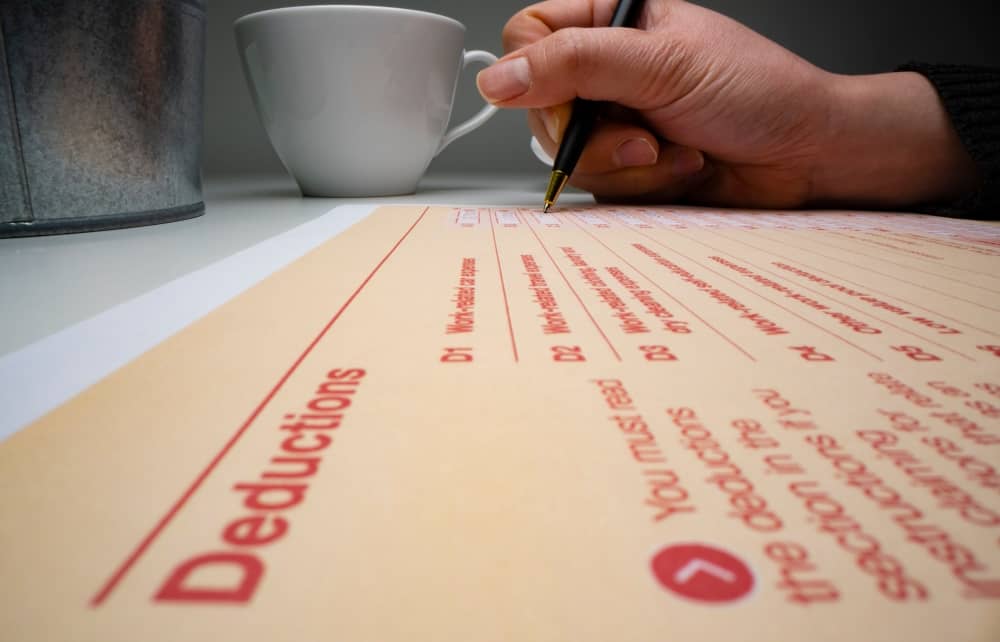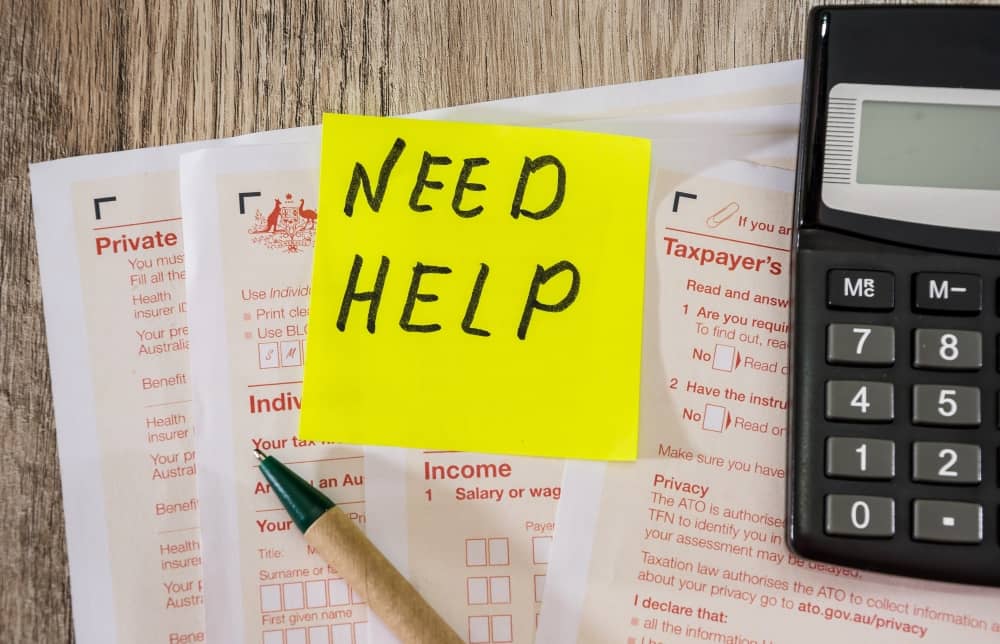The ATO has more tools and technology than ever to detect common tax mistakes, such as incorrect personal information or inflated deductions.
It is crucial to lodge your tax return on time and free of any mistakes to avoid penalties and interest charges.
In this tax guide, I’ll cover 6 common tax mistakes and how to avoid them to ensure you get the maximum return you are entitled to and avoid any penalties from the ATO.
The 6 Most Common Tax Mistakes
1. Incorrect Personal Details
One of the most common tax mistakes is incorrectly entering personal information. You would be surprised at the amount of simple personal detail errors the Australian Taxation Office sees on tax returns every year.
Examples include:
- Incorrect bank account or routing numbers
- Unsigned forms
- Incorrect personal details, such as a misspelled name
- Incorrect tax file numbers
- Not updating your address if you moved
- Inaccurate or missing bank information
- Incorrect filing status
- Math errors
These common tax mistakes can cause delays in receiving your tax refund. If you choose to receive your refund by direct deposit, double-check that you have the correct bank account and routing numbers on your tax return. Ensure all forms are signed and that your details are accurate.
I recommend that taxpayers double and triple-check all of their calculations when they lodge a tax return. Better yet, hire a tax professional to make sure there are no math errors on your tax return.
2. Guessing on Tax Deductions or Inflating Deductions
The ATO is paying close attention to any deductions you claim. Any expense you claim will be analysed to ensure you are entitled to it and that you have proof of the expense.
If your deduction claims are inflated or incorrect, you’ll be facing possible penalties and interest and will be required to repay the tax amount you initially avoided.
For example, Thomas and Charlotte have a second home they rent out for three months out of the year for extra income. When they lodge their tax return, they claim expenses for the entire year, even though their home was only rented out for three months.
Even though they provided receipts and documentation for all of their deductions, they made one of the most common tax mistakes by trying to claim expenses for the full year.
Because Thomas and Charlotte did not adjust their deduction claims based on the actual months the property was rented, they face a penalty from the ATO and are responsible for paying the tax amount they avoided.
How to avoid this common tax mistake:
- Check the ATO website for clear rules on what deductions are eligible to be claimed: Deductions You Can Claim
- Save all your receipts, especially for claims above $300
- If your employer reimburses you for a work-related expense, do not claim it
- Hire a tax professional who can determine exactly what you can and can’t claim (I especially recommend this if you have a rental income property)
3. Failing to Claim Deductions You Are Entitled To
Although you cannot overclaim deductions, you may be entitled to claim work-related expenses you incurred as part of earning your income.
If you don’t claim these deductions you are entitled to, you’ll be missing out on your maximum tax refund.
For example, Olivia frequently uses her vehicle to drive between work sites, visit clients, and make company deliveries. She knows she can claim a portion of these work-related travel costs but isn’t sure of how it works or how to keep a car logbook. Olivia misses out on the higher refund she is entitled to by not claiming her vehicle use deductions.
You can learn more about how to claim work-related vehicle expenses in my guide here: A Simple Guide to Keeping a Car Logbook for Tax Purposes.
Along with using your vehicle for work, other work-related expenses deductions you may be entitled to claim as deductions include:
- Costs of travelling for work (accommodation or meal costs you incur while travelling for work)
- Cost of equipment or tools needed for your position (i.e. a laptop if you have a home office, provided you use it solely for work. If you use it for both work and personal use, you can only claim the work-related portion of the expense)
A tax accountant can help you sort through your work-related expenses and determine which deductions you are entitled to.
You can also contact our team with questions or check out my various guides to tax deductions, including:
- Tax Deduction Guide for Office Workers
- Tax Return Guide for Nurses, Midwives, and Direct Carers
- Tax Deductions Guide for Retail Industry Workers
- A Complete Guide to Deductions for FIFO Workers
- A Complete Guide to Tax Deductions for Tradies

4. Not Providing Receipts for Deductions or Proof
Lack of receipts or proof of deductions is another one of the common tax mistakes I see. Any time you claim a deduction on your tax refund, you’ll need to prove it. Without receipts, you can only claim up to $300 of work-related expenses.
If you claim deductions and fail to provide proof, you will likely be facing fines from the ATO.
I recommend keeping receipts and documentation of all of your work-related expenses throughout the year. Come tax time, you’ll have all your receipts in one place and have proof of your deductions.
This is especially important for rental property. Keep all documentation, contracts, invoices, and expense receipts.
I talk more about providing receipts for work-related expenses here: Can I Claim Tax Deductions Without a Receipt?
5. Failing to Double-Check Pre-Filled Data from the ATO
If you’ve previously lodged a return through the Australian Taxation Office’s tax portal, it will pre-fill your data using these past details.
However, do not assume this information is correct. Always double-check any pre-filled information to make sure it is accurate and up to date.
6. Failing to Declare All of Your Income
Another one of the most common tax mistakes is failing to declare all of your income. As an employee, your employer automatically takes a portion of your wages out of each paycheck for taxes. However, this is not your only income.
Other sources of income, such as sole trader work, count toward your “assessable income”. Your assessable income is the figure the ATO uses to determine how much you owe in taxes for that financial year.
Your assessable income includes:
- Pensions and annuities
- Foreign employment income
- Bank interest
- Allowances
- Dividends
- Rental income
- Untaxed government payments
- Income from side gigs, freelance gigs, or a second job
- Employment income
- Investment Income
- Capital gains (including on overseas assets)
Failing to declare other sources of income, such as pension payments or freelance work, can result in penalties, interest charges, and being required to pay the remaining taxes you owe.
When lodging your tax return, it is imperative that you accurately declare your income, including income from freelance work or side gigs.
If you do freelance work, I suggest keeping at least 30 per cent of your income set aside. This way, you’ll have the money to pay for the taxes you are responsible for when you lodge a return.
Want Help Avoiding Common Tax Mistakes?
Making any of these common tax mistakes can leave you facing penalties, back taxes, or interest charges. Or, if you fail to claim the deductions you are entitled to, you may end up asking yourself, “Why is my tax refund so low?”.
When it comes time to lodge your return, double-check all of your personal information, declare all of your income (including side gigs, bank interest, and foreign income), keep all of your work-related expense receipts, and only claim deductions you are entitled to.
If you want to ensure you lodge an accurate return that gets you the maximum refund you are entitled to, I recommend working with a tax professional.
Our dedicated team of tax professionals can determine the exact expenses you can and can’t claim and lodge an accurate return promptly.
We take all of the guesswork and stress out of the tax return process so you can sit back and wait for the maximum refund amount you are entitled to.
We operate our business entirely online to keep costs low for you. Contact our friendly customer service team by emailing support@taxreturn.com.au, phoning 0499 829 829 (0499 TAX TAX), or filling out our online contact form.



